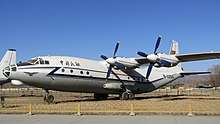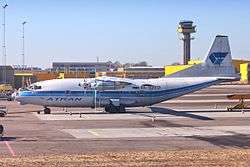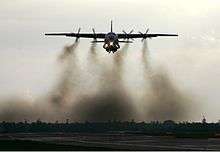Antonov An-12
The Antonov An-12 (Russian: Антонов Ан-12; NATO reporting name: Cub) is a four-engined turboprop transport aircraft designed in the Soviet Union. It is the military version of the Antonov An-10 and has many variants. For more than three decades the An-12 was the standard medium-range cargo and paratroop transport aircraft of the Soviet air forces. A total of 1,248 were eventually built.[2]

| An-12 | |
|---|---|
 | |
| An-12 of the Russian Air Force | |
| Role | Civil and military transport aircraft |
| Manufacturer | Antonov |
| First flight | 16 December[1] 1957 |
| Introduction | 1959 |
| Status | Active service with various airlines (especially cargo) and air forces |
| Primary users | Soviet Air Force Aeroflot PLA Air Force |
| Produced | 1957–1973 |
| Number built | 1,248 |
| Developed from | Antonov An-10 |
| Variants | Shaanxi Y-8 |
Design and development
Developed from the Antonov An-8, the An-12 was a military version of the An-10 passenger transport. The first prototype An-12 flew in December 1957 and entered Soviet military service in 1959. Initially, the aircraft was produced at the State Aviation Factory in Irkutsk. From 1962, production was transferred to Tashkent, where 830 were built. Later, production moved to Voronezh and Kazan.[2]
In military use, the An-12 has capacity for up to 100 fully equipped paratroopers or 20,000 kg (44,090 lb) of cargo, which is loaded through the rear loading ramp/door.[2]
In terms of configuration, size, and capability, the aircraft is similar to the United States-built Lockheed C-130 Hercules. Soviet military and former-Soviet An-12s have a defensive tail gun turret.
Chinese production
In the 1960s, China purchased several An-12 aircraft from the Soviet Union, along with a license to assemble the aircraft locally. Due to the Sino-Soviet split, the Soviet Union withdrew its technical assistance and the first flight of a Chinese-assembled An-12 was delayed until 1974. After USSR ceased production in 1973, the Xi'an Aircraft Company and Xi'an Aircraft Design Institute reverse-engineered the An-12 for local production.[3]
In 1981, the Chinese version of the An-12, designated Y-8, entered production. Since then, the Y-8 has become one of China's most popular military and civilian transport/cargo aircraft, with many variants produced and exported. A Tu-16/H-6 bomber navigator cockpit design was chosen for the Y-8 instead of the original An-12 shorter navigator cockpit design, as the H-6 bomber had been in serial production for some time. Although the An-12 is no longer in use either in Russia or in Ukraine, the Y-8 is upgraded and produced in China. The latest Y8-F600 is a joint venture between the Shaanxi Aircraft Company, Antonov Aeronautical Scientific Technical Complex (ASTC), and Pratt & Whitney Canada. The Y8-F600 has a redesigned fuselage, western avionics, PW150B turboprop engines with an R-408 propeller system, and a two-crew glass cockpit.[5]
Operational history
Soviet Air Forces
The Aircraft first took flight in 1957 and was produced in the USSR until 1973. It was used in a variety of roles from search and rescue operations to equipment transportation. Its most significant use was seen during the Soviet-Afghan War. Among Soviet Soldiers, it was infamously known that the plane would take off from Afghanistan to Tashkent with "Cargo 200" or coffins with the bodies of deceased soldiers. To this regard the aircraft was nicknamed "Black Tulip" (Russian: «Чёрный тюльпан»).[6]
Variants
In addition to its basic cargo transport role, the An-12 was adapted as a platform for a wide variety of specialist tasks and some 30 different variants were produced. Upgrades included increased take-off weights and additional fuel capacity. The upgraded variant An-12BP became the standard tactical transport of the Soviet and other air forces.[2] In 2019, it was announced at the military "Army-2019" Forum that Russia started working on an armed ground-attack and close air support variant of the An-12, similar to the AC-130.[7]
Operators
Currently the An-12 is very popular with cargo operators, especially those in the CIS, Africa and the Indian subcontinent.[8]
Civil operators
On 12 January 2009, the United Arab Emirates (UAE) issued a temporary ban of the An-12 from flying over their airspace following runway incursions at Sharjah International Airport and the GCAA has advised operators to stop using the aircraft.[9][10] The ban was made permanent in Feb 2010.[11]
|
|
|
Military operators
|
|
|


Accidents and incidents
Specifications (An-12)

Data from Global Aircraft,[28] Airliners.net[29]
General characteristics
- Crew: 5 (two pilots, flight engineer, navigator, radio operator)
- Capacity: 20,000 kg (44,092 lb) payload / 60 paratroopers / 2x BMD-1 armoured vehicles
- Length: 33.1 m (108 ft 7 in)
- Wingspan: 38 m (124 ft 8 in)
- Height: 10.53 m (34 ft 7 in)
- Wing area: 121.7 m2 (1,310 sq ft)
- Empty weight: 28,000 kg (61,729 lb)
- Max takeoff weight: 61,000 kg (134,482 lb)
- Powerplant: 4 × Ivchenko AI-20L or AI-20M turboprop engines, 3,000 kW (4,000 shp) each equivalent
- Propellers: 4-bladed constant-speed reversible-pitch propellers
Performance
- Maximum speed: 660 km/h (410 mph, 360 kn)
- Cruise speed: 570 km/h (350 mph, 310 kn)
- Range: 5,700 km (3,500 mi, 3,100 nmi) with maximum fuel
- 3,600 km (2,200 mi; 1,900 nmi) with maximum payload
- Service ceiling: 10,200 m (33,500 ft)
- Rate of climb: 10 m/s (2,000 ft/min)
Armament
- Guns: 2× 23 mm (0.906 in) Nudelman-Rikhter NR-23 cannons in a tail turret (some aircraft)
Notable appearances in media
See also
Related development
Aircraft of comparable role, configuration and era
- Lockheed C-130 Hercules
- Transall C.160
Related lists
References
Footnotes
- "Antonov official website". Archived from the original on 23 January 2018. Retrieved 15 August 2009.CS1 maint: BOT: original-url status unknown (link)
- Allport, Dave (April 1996). "Military Transport Aircraft Directory (Part 2)". Air International. Vol. 50 no. 4. p. 237.
- "Y8 Turboprop Transport Aircraft". Sino Defence. Archived from the original on 27 March 2008.
- "Y8F600 aircraft". Shaanxi Aircraft Industry. Archived from the original on 21 May 2006.
- "«Чёрный тюльпан»: почему советские солдаты в Афганистане так назвали самолёт АН-12". Русская Семёрка. Archived from the original on 8 April 2020. Retrieved 7 April 2020.
- https://tass.ru/armiya-i-opk/6592791
- Gordon, Yefim & Komissarov, Dmitry. Antonov An-12. Midland. Hinkley. 2007. ISBN 978-1-85780-255-9
- "GCAA issues temporary ban of Antonov An-12 from UAE airspace". Archived from the original on 1 February 2009. Retrieved 13 January 2009.
- "United Arab Emirates bans flights of Soviet-built An-12 aircraft". Archived from the original on 1 February 2009. Retrieved 13 January 2009.
- "UAE bans ANTONOV An-12 aircraft from its airspace". The Times of India. 19 February 2010. Archived from the original on 21 February 2010. Retrieved 19 February 2010.
- "SRX :: Fleet". Archived from the original on 31 October 2014. Retrieved 26 December 2014.
- Endres 1979, p. 189.
- Endres 1979, p. 15.
- Vintage Russian. Props and Jets of the Iron Curtain Airlines, Airlife Publishing, Shrewsbury 1998, ISBN 1-85310-971-1.
- Endres 1979, p. 401–402.
- Endres 1979, p. 351.
- Hoyle Flight International 8–14 December 2015, p. 32.
- Hoyle Flight International 8–14 December 2015, p. 37.
- Hoyle Flight International 8–14 December 2015, p. 41.
- Hoyle Flight International 8–14 December 2015, p. 46.
- Hoyle Flight International 8–14 December 2015, p. 48.
- Hoyle Flight International 8–14 December 2015, p. 53.
- "Armament of the Georgian Army". Georgian Army. Archived from the original on 9 March 2012. Retrieved 25 June 2007.
- "Archived copy". Archived from the original on 5 September 2012. Retrieved 8 January 2013.CS1 maint: archived copy as title (link)
- Gołąbek, Adam: 13. Pułk Lotnictwa Transportowego in: Lotnictwo z szachownicą nr. 9 and nr. 10
- Radek Havelka. "An-12BP 2209 :: An-12BP". valka. Archived from the original on 26 December 2014. Retrieved 26 December 2014.
- "An-12 Cub". Global Aircraft. Archived from the original on 19 February 2006. Retrieved 9 March 2006.
- "The Antonov An-12 & Shaanxi Y8". Airliners.net. Archived from the original on 19 February 2006. Retrieved 9 March 2006.
Sources
- Endres, Günter G. (1979). World Airline Fleets 1979. Hounslow, UK: Airline Publications and Sales Ltd. ISBN 978-0-905117-53-9..
- Hoyle, Craig (8–14 December 2015). "World Air Forces Directory". Flight International. Vol. 188 no. 5517. pp. 26–53. ISSN 0015-3710.
External links
| Wikimedia Commons has media related to Antonov An-12. |